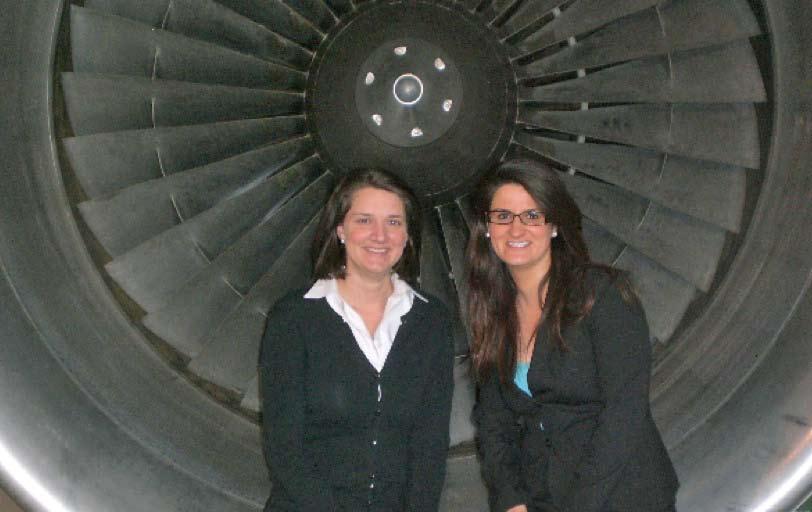
14 minute read
The Classroom as Boardroom
THE Class room
as Board room

How real-world business issues are being solved in the classroom
By CHris NiCHolsoN
illusTraTioN By kEiTH NEglEy
The summer of 2009 began in a familiar
manner for VsB professor Peggy Chaudhry. With the spring semester over and a blanket of heat and humidity firmly in place over the campus, Chaudhry set off across the atlantic along with 45 VsB students for cooler weather and an experience with a few of the many international corporations based in london. The trip, an annual offering popular among VsB’s students, has a long track record of success.

During the course of her 11 years leading more than 450 students overseas, Chaudhry and other VSB faculty have connected with the BBC, Burberry, Citigroup, Dow Jones Financial Information Services, Disney Channel-UK, KPMG, and several other prominent firms located in London. The students also take one course at the London School of Economics and Political Science.
The trip during that summer of 2009, however, brought more than the usual round of meetings, experience, and international exchange. While she was in London, Chaudhry received a phone call from Matthew Roy VSB ’08, who now works as a finance analyst for RollsRoyce Defense Sector, offering to help create a VSB course that would directly involve students in solving real-world international business issues facing the company.
“I was so used to working in the classroom with what I call ‘canned cases’ developed by the Harvard Business School,” says Chaudhry, associate professor of management and operations. “The opportunity for students to immediately apply what they learn in the classroom to help make real-world decisions for an international corporation is as valuable as it is rare.” Although teaching within this new paradigm lacks the advantages of prepared materials and set lesson plans, Chaudhry jumped at the chance to bring Rolls-Royce into her classroom—and her students into Rolls-Royce’s boardroom. VSB also works with many other companies in the classroom. Vanguard, Johnson & Johnson, Boeing, and American Eagle Outfitters are just a few of the organizations that partner with our students and faculty on live cases throughout the year.
Chaudhry’s course, International Comparative Management, launched its revamped syllabus in the fall of 2009, just a few weeks after Roy’s offer. In the newly redesigned course—which remains required for management and international business majors and minors–students work as a team to research worldwide foreign direct investment opportunities. After designing and performing both qualitative and quantitative analyses, the course’s first two teams selected Dubai and South Korea from among an original list of five countries as potential project locations. At the end of the semester, they pitched their business plan for manufacturing jet engines for the commercial sector directly to upper-echelon Rolls-Royce managers.
“It was really interesting to see how the students made decisions— and that’s actually the goal,” Chaudhry says. “It’s not so much their final decision as it is how they’re justifying the rationale for the outcome. You have to make a variety of decisions, ranging from quantitative arguments such as the net present value of the investment or estimating supply chain costs, to qualitative inferences, such as the ability to cultivate the relevance of the firm to key government stakeholders in the country. We want the students to understand the myriad judgments that have to be made to plan these multimillion-dollar investments.”
Will Powers, chief financial officer of Rolls-Royce North America, a 1982 VSB graduate and a member of the Dean’s Advisory Council, agrees. “We’re not actually interested in someone finding the right answer,” he says, “but rather the process by which they go about analyzing the problems. Some answers have been very good, and some not so. But it’s more about how they work in teams, how they go about solving the problem that we are interested in.”
Working on live cases exposes students to the dynamics of international industry in a way that even the most well-designed “canned case” likely would fail to do. “What we have done with Professor Chaudhry is bring our business to VSB students so that they can get a glimpse of what it is like to be out in the real world on a daily basis,” says Matthew Roy. “More importantly, though, is it gives them a diverse experience in
for students well-suited for summer internships and entry-level positions at their offices located all over the world, from Virginia to England to Singapore. “Rolls-Royce looks at this as a way to deepen its connections with Villanova and also as a recruiting opportunity,” Chaudhry says. “The company wants to expose more business students to careers in global high-value-added industries.” “My goal was to help Professor Chaudhry widen the students’ perspective. There is more to life than investment banking, consulting, and accountancy,” says Will Powers. “The future of Students visited the Rolls-Royce factory in Derby, England, with Professor Chaudhry to advanced manufacturing is to attract a material learn about jet engine manufacturing. share of the best and brightest. Unfortunately, many undergraduate and even graduate busiwhich marketing majors interact with management majors and finance ness students have never visited a factory or an assembly plant—let alone majors—exactly like the real world.” one that is involved with advanced manufacturing.”
The course has since evolved, honed by Chaudhry, Powers, and Roy. Given this lack of experiential knowledge of manufacturing among Students now work in 10-person teams on a live case with three possible the students, Powers and Professor Chaudhry worked with Boeing investment sites. Last semester, nine teams looked at the viability of a Helicopters’ Doug Leonard MBA ’08 to arrange two plant visits for a firstplant expansion in Derby, England; Prince George’s County, Virginia; hand look at the assembly lines for Boeing’s V-22 Osprey and Chinook and Singapore. Each team worked with Sheryl Bowen, a communica- helicopters. The students also were shown how Boeing uses computertion professor in arts & sciences, to help them refine their proposals into generated imagery to trouble-shoot design issues with the V-22 Osprey. succinct 10-minute pitches to deliver to Rolls-Royce managers at the Rolls-Royce has been actively recruiting at Villanova since 2004, end of the semester. During the course, the students and Rolls-Royce and many recent alums are filling key roles within the company. For managers participated in several online web conferences. The students example, Nina Falco VSB ’04 is a Virginia-based manager of Financial also met at least six times for guest lectures by top Rolls-Royce execu- Services; Julie Corvo VSB ’05 is working in the U.K. managing the tives from a variety of disciplines, such as market analysis and supply firm’s financial relationship with its largest strategic supplying partner; chain management. Whitney Anderson VSB ’07 is a financial analyst based in Oakland,
Those lectures go far beyond superficial accounts of job descrip- California; and Carlos Pradera VSB ’09 is in Rolls-Royce’s Financial tions or “when I was in your shoes” pep talks. During the past year, Leadership Development Program in Derby, England. for example, Rolls-Royce North America’s manager of human resources “Our leadership is familiar with the performance of VSB grads Tracey McCoy gave the students an in-depth lecture via web confer- currently working in the organization, and they know what to expect ence on workforce development. Dean Roberts, director of market in terms of technical skills,” Roy says. “But what sets Villanova gradustrategy for Rolls-Royce Corporate and Regional, discussed business- ates apart are our interpersonal skills and clear understanding of the to-business and business-to-government strategies as well as assessing importance of relationship building. These ‘softer’ skills are stressed in investment risk using Monte Carlo analysis. And Rhonda Van Lowe, the liberal arts side of a Villanova education and have very positively associate general counsel for Rolls-Royce North America, spoke about impacted VSB’s reputation within Rolls-Royce.” negotiating the company’s foreign direct investment incentives with the That respect is reflected in the firm’s personal interest in students’ Commonwealth of Virginia. growth. CFO Powers not only participates in much of the planning and
Rolls-Royce’s involvement in the course is partly altruistic—after all, execution of the International Comparative Management course, but Roy and Powers are actively giving back to their alma mater—although he also offers students an open line direct to his desk. “If a student wants the relationship and the work the students do obviously benefit the to email him, he or she can. He’s very hands-on,” Chaudhry says. “And company. Their gain, though, also is VSB’s gain: great job opportunities he always sends me emails about how VSB interns or alumni are doing. for bright graduates. Through their involvement with the International It’s a testament to his leadership style that he really does mentor these Comparative Management course, Rolls-Royce executives can watch students. That’s why I love working with him.”


From top left: Whitney Anderson VSB ’07, Financial Analyst-RR Engine Services Oakland; Brett Gora VSB ’10, Finance Associate-Leadership Development Program; Davis O’Brien VSB ’09, Finance Associate-Leadership Development Program; Matt Roy VSB ’08, Finance Analyst-Defense Sector; Molly McNary VSB ’11, Finance Associate-Leadership Development Program; Carlos M. Pradera VSB ’10, Finance Associate-Leadership Development Program; Michael Van Dyke VSB ’09, Materials Resource Planning Controller; Nina Falco VSB ’04, Business Development Manager; Julie Corvo VSB ’05, Finance Analyst-Risk and Revenue Sharing Partners and Patricia Orfini VSB ’07, Enterprise Risk Analyst.
While rolls-royce’s relationship with VsB has grown exponentially over the past year, the company is but one of many top organizations with deep ties to the school. other companies—including interalia, merck, Vanguard, Johnson & Johnson (J&J), morgan stanley, JPmorgan Chase, american Eagle outfitters, and Boeing—participate in meaningful ways in the school’s course offerings and in the lives of VsB students. many of these companies are led by VsB alumni.

J&J has been a presence in VSB classrooms for almost a decade. In the long-running and popular Management Essentials course, teams of students created a consumer product idea, developed a marketing plan and financial rationale, and then pitched their strategy to a panel of J&J executives acting as venture capitalists. “It was very successful,” says course instructor James Glasgow, “because it provided an opportunity for them to work on a hypothetical business project, it gave them exposure to outside executives, and it gave them the opportunity to utilize not only the team management skills they were learning but also to incorporate their marketing and accounting course information.”
That course morphed into today’s Competitive Effectiveness, a required six-credit, sophomore-level course team-taught by marketing and management professors. The course’s new incarnation asks students to work on live cases provided by J&J, Vanguard, Tasty Baking Company, and others. For example, American Eagle Outfitters asked last year’s class to examine how they could best market denim for backto-school promotions and how to make the stores a gifting destination for their 20-year-old target customer. “Now the students are working on real issues, real business problems for these firms—everything is truly grounded in reality,” Glasgow says. “And the ideas coming from the students are viable. The feedback I’ve had from all the firms is that they receive some excellent insights and some excellent ideas to implement.”
J&J did not begin this relationship blindly. “About 10 years ago, we were evaluating our high-potential people, and some of the information that was included in their profiles was the schools that people had attended,” says Martin Pagliughi, a group finance director for J&J who earned his MBA at VSB in 2000. “Villanova popped out as one of the
schools that a lot of the high-potential people in our organization had attended at the undergraduate or graduate level, so we reached out and started to develop a relationship.”
Since then, the New Jersey-based company has hired countless VSB students and new graduates into summer internships, full-time employment, and positions in its co-op program. The latter has been notably successful. J&J designed its co-op with Villanova as a six-credit, six-month curriculum-based program in which students work in the company’s accounting and finance department. Pagliughi says his company taps VSB students for approximately 10 to 20 co-ops, two to five internships, and three to 10 full-time positions every year.
American Eagle Outfitters (AEO) also has broad and deep connections with VSB. “We go to campus pretty much every semester,” says Jennifer Newman, campus recruiter for the company. In addition to the classroom cases it provides, AEO also attends job fairs, conducts on-campus interviewing, and provides speakers for classes to relate course material to the activities of its retail business. One of those speakers has been American Eagle CEO Jim O’Donnell, a 1963 VSB graduate.
In the past two years, AEO has hired several VSB graduates through its relationship-building efforts, including Jessica Anasti VSB ’08, who is working in Kuwait helping to launch international stores, and Michael Cali VSB ’09, who is working as an assistant buyer for the company’s 77kids line.
“VSB is a great school where we get to see the future leaders of the business industry,” Newman says. “We get to educate them about opportunities in retail and hopefully hire them into our internship or full-time training programs. On the flip side, through a marketing case competition and speaking in classrooms, we give the students the opportunity to learn from a real-world company.”
Yet another corporation that actively recruits VSB students is GE Capital. Tom Quindlen, president and CEO of GE Capital Corporate Finance, began his career there right after completing his degree at VSB in 1984. He now helps bring students into the same Financial Management Program (FMP) that indoctrinated him into GE 26 years ago. The program employs 200 undergraduates from finance, accounting, and other business majors from around the globe. For two years, these students work in a rotation of six-month assignments in various roles and businesses, learning how GE operates.
“Our hope is that some day the talent coming through FMP are going to be running large global financial teams for GE somewhere in the world,” says Quindlen, who serves on the Dean’s Advisory Council and often lectures at VSB. “That could be in China, in Europe, or in the United States. FMP participants are immersed in various businesses and disciplines and come out of the program better prepared to problem solve. Then, they’re provided with great opportunities to demonstrate it.”
GE also offers other opportunities to VSB students, including internships and its Experienced Commercial Leadership Program, which is similar to FMP but designed for graduate students.
VSB students and alumni have found success in all these GE programs largely because the two institutions share similar philosophies. “It’s a perfect relationship because the lessons taught at VSB translate well in a company like GE,” Quindlen says. “We spend a lot of time and money training our future leaders, so we’re looking to find people who share our goals and vision. And we find that the students coming out of the Villanova School of Business fit with our business culture. VSB teaches truth and leading through service, and we’re a company where our leaders first and foremost lead with integrity. We’re very involved with our communities, and VSB has a strong reputation for its community service. The values of VSB and the values of GE are well-aligned.”
Moreover, seeing the success of VSB alumni is beneficial for current students. GE employee Tom O’Connor graduated from VSB in 2009 and is now in his second year of FMP. He remembers GE executives visiting campus when he was an undergraduate and recalls alumni who were well into a GE career path similar to what he hoped for himself. “It was a great inspiration,” he says. “The alumni were great role models for me. They’re obviously individuals who have become very successful as a result of their time at VSB. Through these interactions it became clear that my future goals are attainable and that by going to the Villanova School of Business I could attain this level of success.”
Daniella Cestone agrees. She graduated from VSB in 2010 and is working as an assistant buyer teammate in American Eagle’s 16-week training program. “As an undergraduate I met recent alumni, who were just starting new jobs, as well as seasoned CEOs,” she says. “Since VSB brought so many industry professionals to Bartley Hall, the idea of getting a job with one of them seemed more attainable. Knowing that those people were once in my shoes really put things in perspective.”
VSB plans to provide that value well into the future. “Being able to connect our students with some of the best corporations in myriad industries is a key advantage of the quality education we provide,” says James M. Danko, the Helen and William O’Toole Dean. “We’re very grateful for the robust and dynamic relationships we’ve forged with these companies and others, and we’re confident that our graduates’ career endeavors will represent a sound return on the valuable investment these firms are making in our institution.”
That commitment to these vital relationships is recognized by the very group that benefits most: the students. Well into his professional career, O’Connor still appreciates the opportunities those partnerships provided. “It was great to see how many companies were involved with VSB and how respected our school is within these companies. They helped illustrate what careers are attainable,” he says. “I’m on a great professional path and GE is a great company to work for. I owe it all to the Villanova School of Business and how its connections helped me.” V










